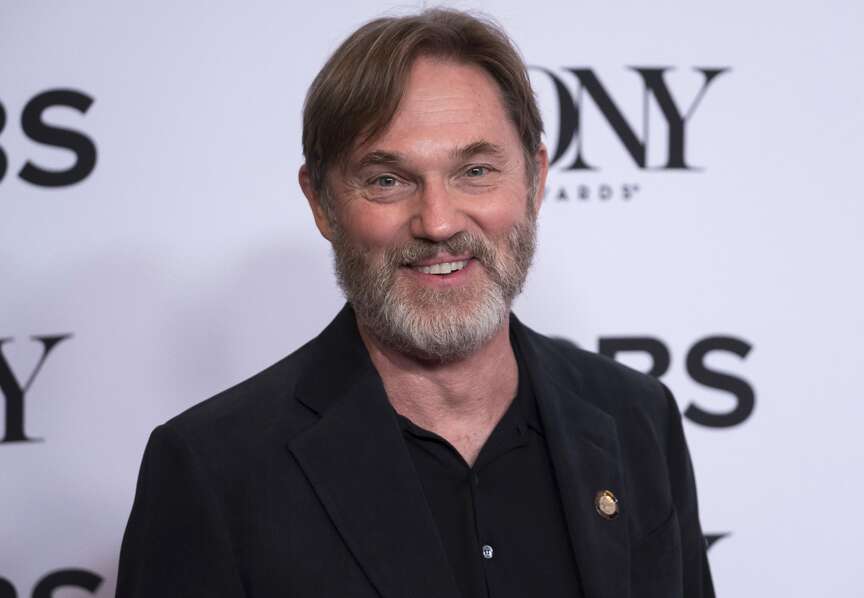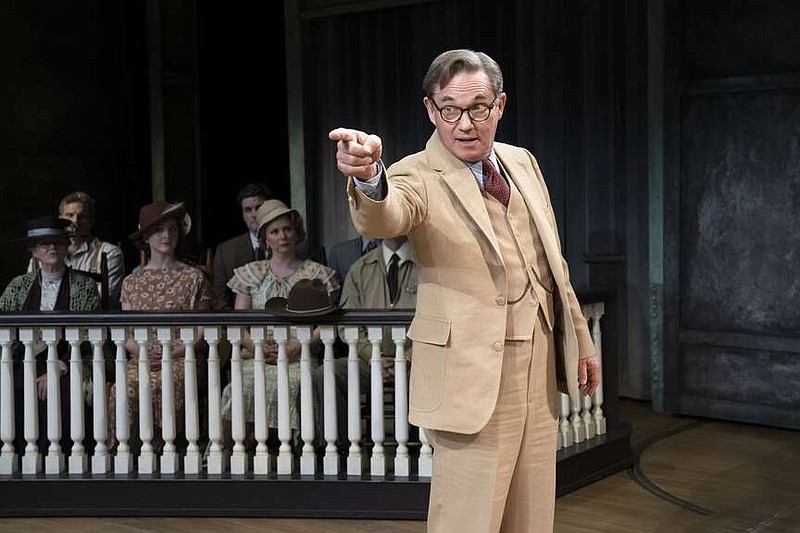The character of Atticus Finch is so beloved that when Richard Thomas walked on stage last night, he was met with applause for the opening night of "To Kill a Mockingbird" at the Walton Arts Center.
In an interview with Arkansas Democrat-Gazette writer Eric Harrison, Thomas said Sorkin's adaptation is "utterly faithful to Harper Lee, to the spirit of the story. ... Liberties have been taken, but classics have a way of surviving -- that's why they're classics."
A 2018 New Yorker essay declared "To Kill a Mockingbird" "a kind of secular scripture, one of only a handful of texts most Americans have in common." The character of Atticus Finch has inspired a generation of lawyers for his unshakable pursuit of justice for Tom Robinson, falsely accused of raping a poor white woman in Depression-era Macon, Ga.
Over the years, his character has faced some scrutiny, which Sorkin's adaptation treats with the same even-handedness that Finch possesses by allowing some of the minor characters a few more lines and a little more plot.
"It offers a more present mode of discussion for things like social justice, history, racism, using the lens we look through now," Thomas explained. But it doesn't rewrite the story.
"It takes Atticus off a pedestal -- that's a great gift to any actor," Thomas said. "It puts Atticus' story front and center, but with the same loss of innocence; I can play him as a [simpler] country lawyer ... But it still gives him unassailable virtues. He gets a very close look in this adaptation; he tries to do the right thing against all odds."
Calpurnia, who was a little sassy in the book, is far more bold in this adaptation. She confronts Atticus when he doesn't see his own prejudices and biases that allow him to show people respect "no matter who they disrespect in the world."
Another difference between the book and the stage is that Link Deas, who plays Tom Robinson's boss and the town drunk, is given a heartbreaking past. He's a contrast to Atticus -- seeming to lack virtue because of his drinking habit and avoidance of church -- despite being an advocate for social justice and the one man in town who is brave enough to testify on Tom Robinson's behalf.
Sorkin also drops the religious feuding between the Finches' neighbors and instead centralizes the South's racist caste system based on income, education and skin color: The farmers think they're better than the Black residents; the city people think they are better than the farmers; and the educated think they are better than everyone else.
Under a 21st century lens, it's more apparent that Finch has been complicit in maintaining these norms that perpetuate the system of indignity against others even as he ironically declares, "A man will have his dignity." He knows how far people will go to maintain it, but he doesn't see how by trying to see the good in everyone, he allows evil -- as personified by Bob Ewell -- to persist.
With such serious material, it's hard to find moments of humor in the performance, but Thomas meets the challenge.
His depiction of Atticus Finch has a joyfulness. He's still humble and homespun, but lively. His energy on stage matches that of the kids. He's on the stage almost as much as Scout, who narrates with her brother Jem and Dill Harris, the play's main source of comic relief and a giver of homespun wisdom too. Steven Lee Johnson's portrayal of the precocious 9-year-old never failed to get a laugh.
Mrs. Henry Dubose is still present and mean as ever in the story. She is played by Mary Badham, who earned an Oscar nomination for her portrayal of Scout in the 1962 film. She's only on stage for a moment, but she kills it.
For the opening show, Liv Rooth played Mayella Ewell, the white woman who accuses Tom Robinson of rape. She did an excellent job of creating a character that you both despise and pity. While Ted Koch's depiction of Bob Ewell is stirring -- he's scary. At times funny, but always a commanding presence.
Jacqueline Williams, who portrays Calpurnia, gives a subdued yet powerful performance -- and was my favorite on stage. The tension her character feels is palpable, no matter where you are in the audience. Though she doesn't have as many lines as Atticus, she says just as much with her body language and at one point a well-timed look at the audience. Her character is written to challenge Atticus, but she doesn't save the day, so she avoids the tired "Black savior trope."
If I have to complain about something, it's that Tom Robinson seems to fade into the background, although Yaegel T. Welch gives a powerful performance when Robinson takes the stand. It's his only real chance to perform dialogue and show the difficult position that kindness put him in -- how showing dignity to others is a privilege not afforded to those on the bottom.
I went into the show worried about how one of my favorite novels would play on stage but came out feeling just as moved as when I first read the book in junior high school and later in college. In fact, I feel like I understand the character and the story better.
The classics do, indeed, have a way of surviving.
__
FAQ
'To Kill A Mockingbird'
WHEN -- 7 p.m. April 17; 1:30 & 7 p.m. April 18; 8 p.m. April 19; 2 & 8 p.m. April 20; 2 p.m. April 21
WHERE -- Walton Arts Center in Fayetteville
COST -- $52-$125
INFO -- 443-5600; waltonartscenter.org
 Richard Thomas participates in the 2017 Tony Awards Meet the Nominees press day at the Sofitel New York hotel. Now 71 and starring as lawyer Atticus Finch in a touring production of "To Kill a Mockingbird," the former "The Waltons" star said he still hears fans call "Good night, John-Boy!" after each performance. "It's kind of astonishing that we're still talking about a show 50 years later," he says. (Photo by Charles Sykes/Invision/AP)
Richard Thomas participates in the 2017 Tony Awards Meet the Nominees press day at the Sofitel New York hotel. Now 71 and starring as lawyer Atticus Finch in a touring production of "To Kill a Mockingbird," the former "The Waltons" star said he still hears fans call "Good night, John-Boy!" after each performance. "It's kind of astonishing that we're still talking about a show 50 years later," he says. (Photo by Charles Sykes/Invision/AP)
